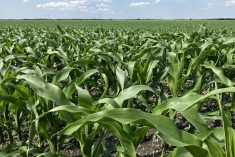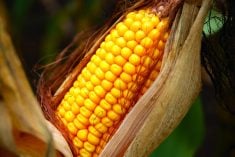A U.S. challenge under the Canada-U.S.-Mexico free trade agreement (CUSMA), against Mexico’s planned ban on genetically modified corn, will now also have Canada at the table.
Rob Stewart, Canada’s deputy minister for international trade, wrote Friday to U.S. and Mexican trade officials, formally announcing Canada’s intent to take part in the CUSMA dispute settlement consultations U.S. officials requested earlier this month.
“Canada shares the concerns of the U.S. that Mexico’s measures are not scientifically supported and have the potential to unnecessarily disrupt trade in the North American market,” federal Agriculture Minister Marie-Claude Bibeau and Trade Minister Mary Ng said in a joint statement Friday.
Read Also

Mexico agriculture secretary says still no date for restarting cattle exports to U.S.
Mexican Agriculture Minister Julio Berdegue said on Wednesday that Mexico and the United States have not yet set a date to resume Mexican cattle exports amid an outbreak of the flesh-eating screwworm parasite.
U.S. Ag Secretary Tom Vilsack and Trade Representative Katherine Tai on June 2 announced that Washington would seek dispute settlement consultations, following a round of technical consultations with Mexico in March under the sanitary and phytosanitary measures (SPS) chapter of the CUSMA pact.
Those technical consultations “did not resolve the matter,” Tai said in a statement June 2.
Bibeau and Ng said the dispute settlement consultations cover measures laid out in a presidential decree published by Mexico in February — “namely the ban on use of biotechnology corn in tortillas and dough, the intention to gradually substitute the use of biotechnology corn in all products for human consumption and animal feed.”
The consultations are also meant to address Mexico’s plans for “rejection of applications for authorizations covering the importation and sale of certain biotechnology products,” the ministers said.
Mexico has been discussing such a ban since 2020, citing sustainability, self-sufficiency and the protection of native corn varieties, with the stated aim of ultimately replacing its imports of U.S. yellow corn with domestic non-GMO production and halting the use of glyphosate herbicide.
“We have always been clear that Canada expects our partners to uphold their commitments under CUSMA — including sanitary and phytosanitary measures,” the Canadian ministers said in Friday’s statement.
The federal government, they said, is “committed to science-based decision-making and keeping food, feed and the environment safe, while supporting the ability of our farmers, workers and exporters to succeed in an innovative and sustainable agricultural sector.”
In these consultations, they said, Canada will work toward “an outcome that preserves trade predictability and market access for our farmers and exporters.”
“When a key trading partner such as Mexico does not authorize biotechnology applications for Canadian agricultural exports, this creates an asymmetry in North American regulatory conditions that can lead to trade disruptions,” Stewart said in Friday’s letter to U.S. and Mexican officials.
Mexico’s approach in its decisions “may have a significant economic impact on Canadian producers, developers of innovative agricultural technologies, as well as consequences for trade flows into and out of Canada,” he wrote.
Canada, he added, has “an important systemic interest in ensuring the correct interpretation of the sanitary and phytosanitary (SPS) obligations of CUSMA, namely that SPS measures are based on scientific principles, relevant international standards, guidelines and recommendations, or appropriate risk assessments.”
Also, he wrote, Canada maintains that “SPS measures shall not be more trade-restrictive than required to achieve a party’s appropriate level of protection and shall be applied only to the extent necessary to protect human, animal, or plant life or health.”
The Canada Grains Council, in a separate release Friday, hailed Ottawa’s decision, saying “Mexico’s decision to ban products with a proven record of safety has far-reaching consequences.”
The introduction of Mexico’s decree has “injected uncertainty into North American markets,” CGC vice-president Krista Thomas said, and if the measure is not withdrawn, “it has the potential to trigger food price inflation and undermine food security within the intricate supply chains of North America.”
There have been “some positive signals from Mexico recently” on the matter, the Canola Council of Canada said Friday in a separate statement, but “more formal and substantive assurance is required to provide clarity and certainty about the regulatory approach moving forward.
“Without that, there is concern that similar issues could arise in the future and precedence established for approaches not based on science.”
For its part, the U.S. government “has been clear that it would consider all options, including further steps to enforce U.S. rights under (CUSMA), if Mexico did not return to science- and risk-based biotechnology policies that are in compliance with (CUSMA) commitments,” the USTR said June 2. — Glacier FarmMedia Network













